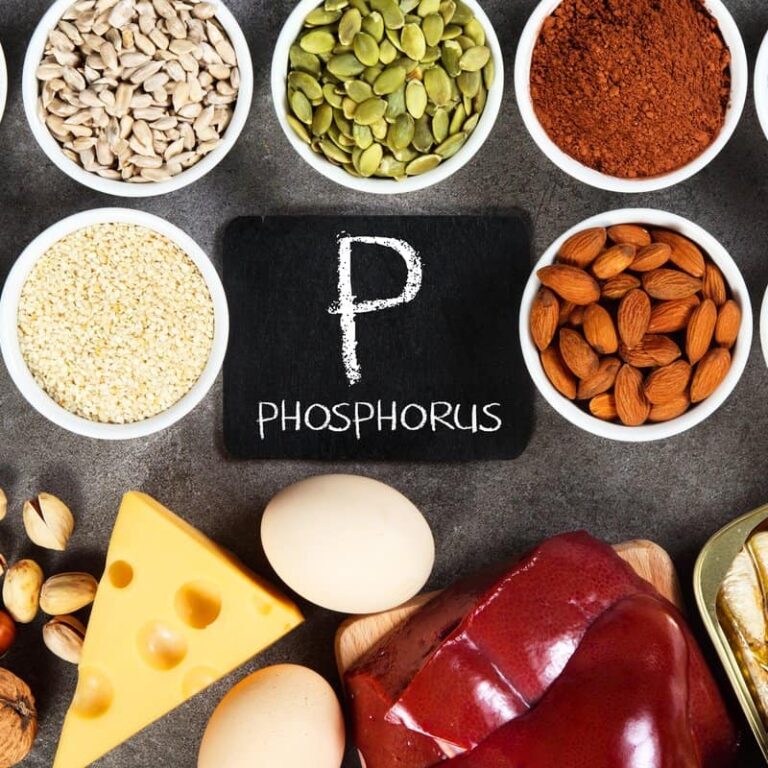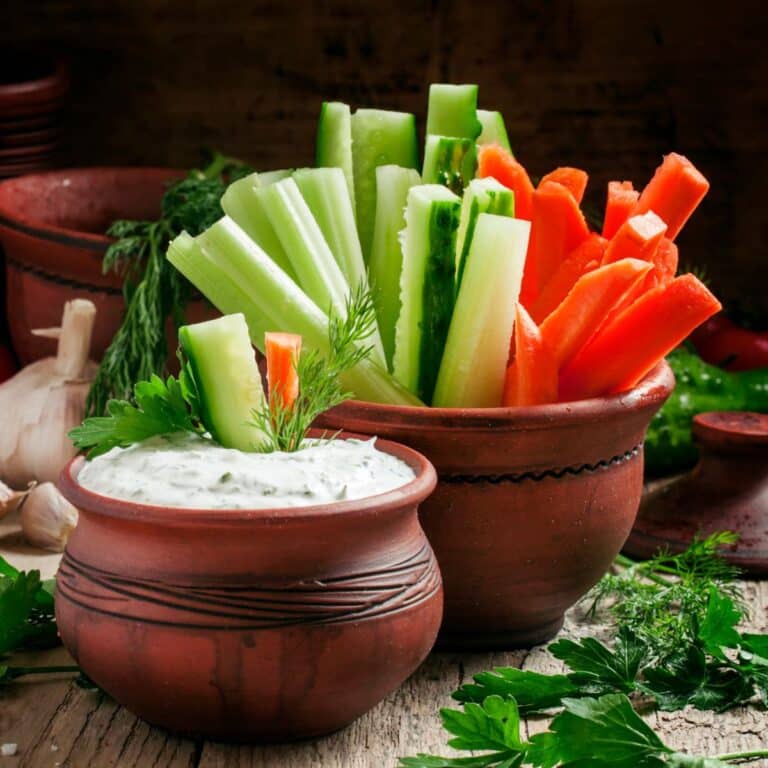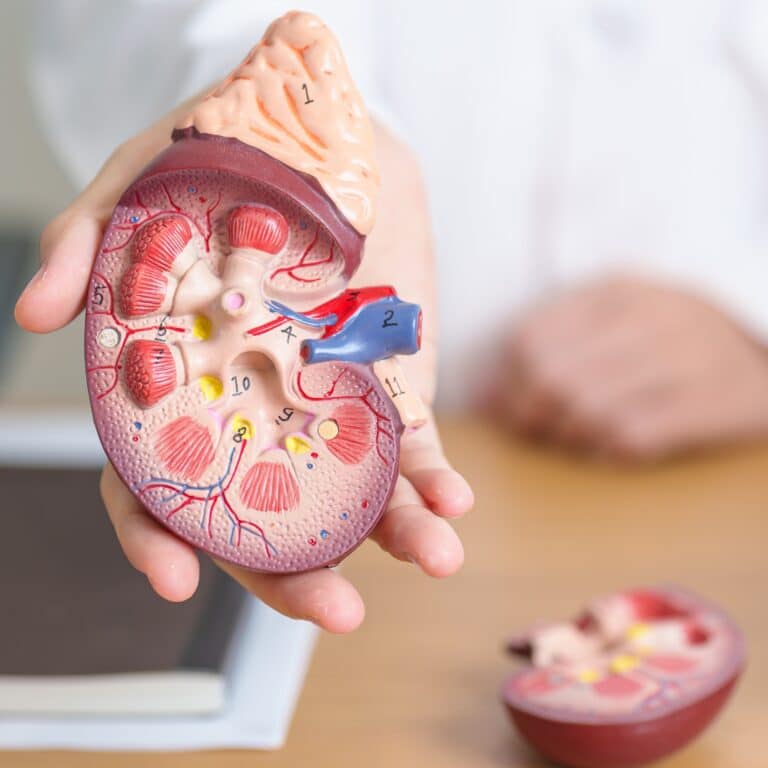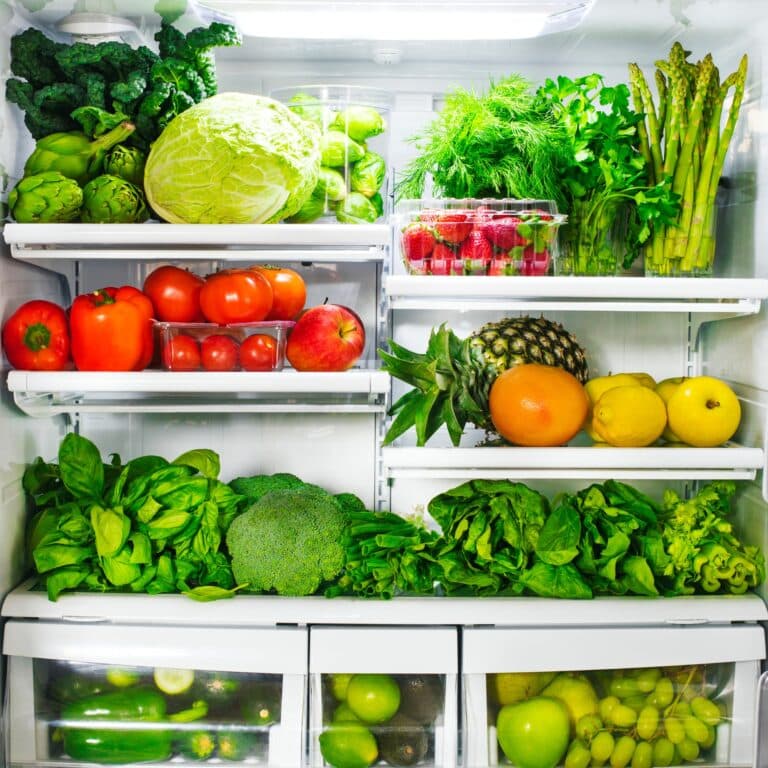Meal Prep For Kidney Disease Patient
If you're feeling overwhelmed about meal prep for a loved one with kidney disease, rest assured that we have all the guidance and support you need.
This article will guide you through the nutritional needs, portion control, weekly menu planning, and tasty recipe adaptations.
You'll learn how to whip up delicious meals that'll keep them healthy and satisfied.
Let's dive in and make managing kidney disease easier through proper nutrition, while dealing with Chronic Kidney Disease.
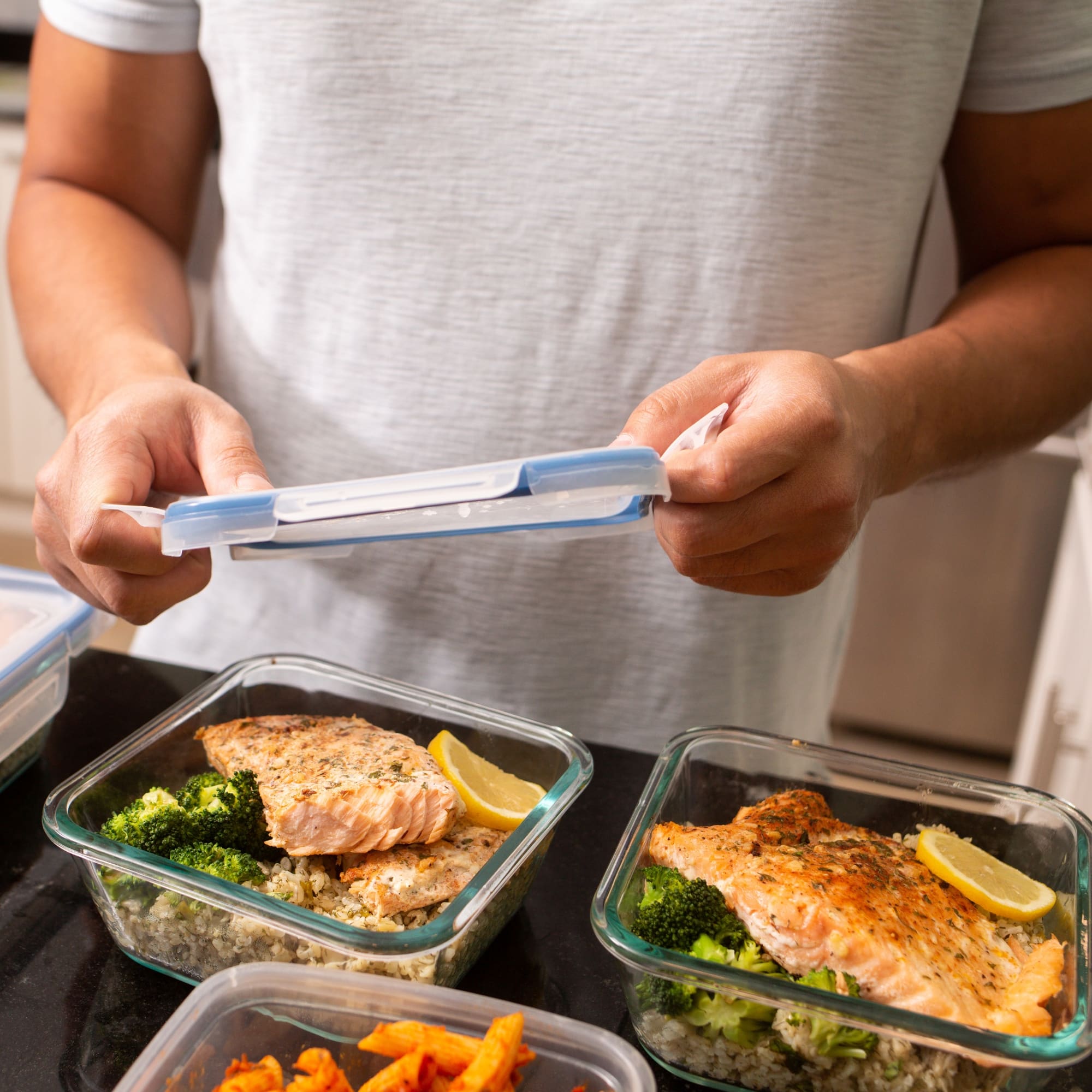
Jump to:
- Key Takeaways
- Understanding the Dietary Needs of Kidney Disease Patients
- Essential Nutrients and Their Role in Kidney Health
- The Importance of Portion Control in Kidney Disease Management
- Planning a Kidney-Friendly Weekly Menu
- How to Cook and Prepare Kidney-Friendly Meals
- Grocery Shopping Tips for Kidney Disease Patients
- Delicious and Nutritious Kidney-Friendly Recipes
- Adapting Favorite Recipes for Kidney Health
- Tips for Eating Out With Kidney Disease
- Staying Motivated and Consistent With Your Kidney Health Meal Plan
- Frequently Asked Questions
- Meal Planning Is An Important Part of CKD
Key Takeaways
- Meal prep is crucial for kidney disease patients to manage their dietary restrictions and overall health.
- It is important to avoid high sodium and potassium foods in meal preparation to prevent disease progression.
- Tailoring the dialysis diet is essential for optimal nutrient absorption, especially in managing protein and phosphorus intake. For example, finding salt substitutes.
- Balanced meal planning, incorporating seasonal fruits and vegetables, can help provide variety and nutrition for kidney disease patients.
For More Recipes and Ideas --->> Get Your Free Meals and Recipes That Are Perfect for Pre-Dialysis Diets, Pre-Dialysis with Diabetes, or Dialysis Diets.
Understanding the Dietary Needs of Kidney Disease Patients
As you navigate through your journey with kidney disease, understanding dietary restrictions is crucial to manage your overall health.
We're here to help you grasp the importance of nutrient intake and how it directly affects your kidneys' functionality.
You'll find yourself switching out orange juice and making healthier choices! Brown rice and rice cereals may just become your go to foods! Dietary recommendations are similar for most kidney patients, but can be customized for your particular situation.
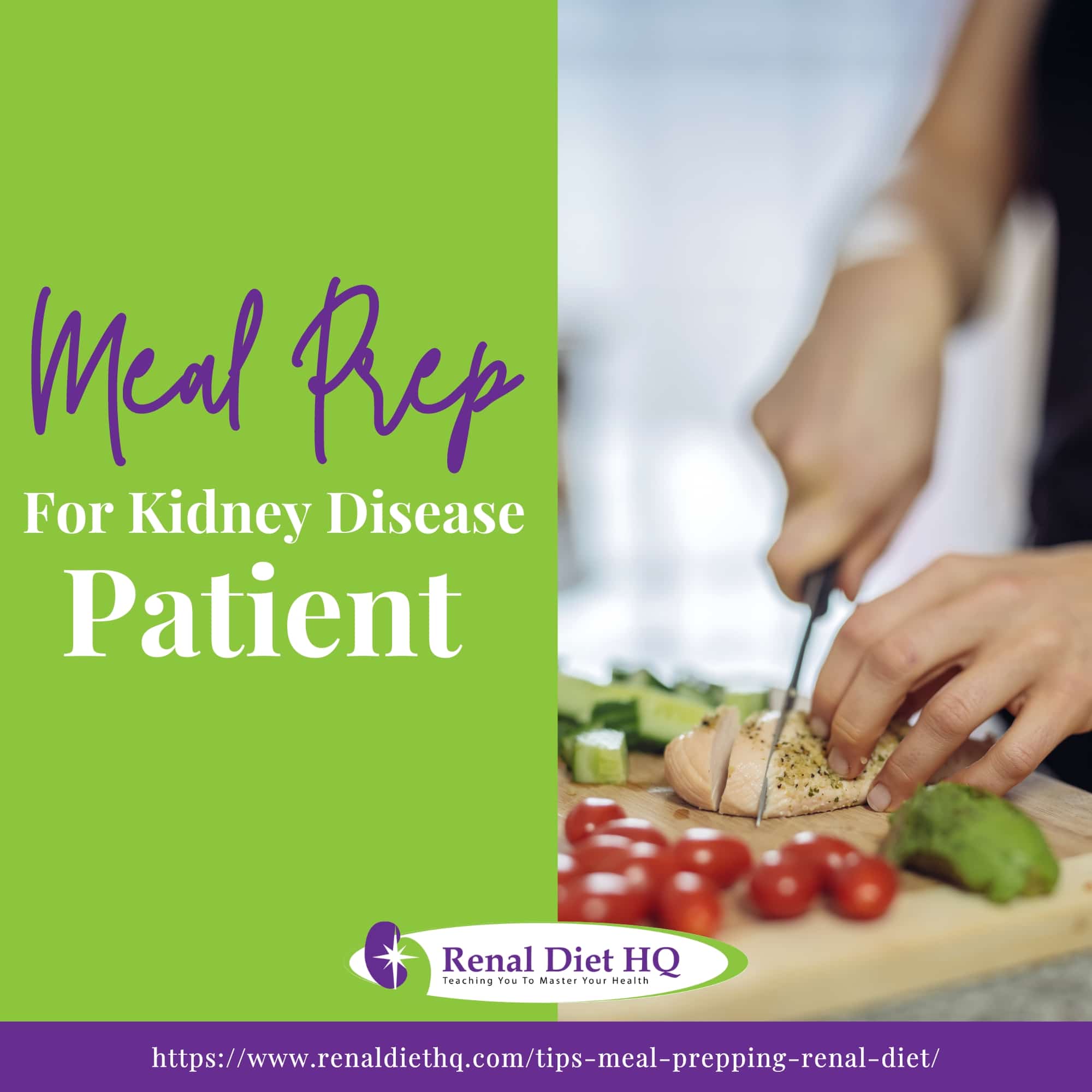
Dietary Restrictions for Patients
You'll need to pay close attention to your diet, avoiding high sodium and potassium foods. This is crucial in managing disease progression. You may be enjoying less convenience foods and more heart-healthy foods.
As patient support, it's your duty to ensure suitable lifestyle changes are implemented. This includes cooking meals low in salt and potassium but rich in essential nutrients.
Don't forget the importance of exercise too.Gentle activity can help maintain overall health.
Mental health also plays a vital role here. It's tough accepting dietary restrictions initially, which can lead to stress or anxiety. This is why a healthy diet is so important and a renal diet plan can help relieve stress or anxiety.
Managing Nutrient Intake
Managing nutrient intake on a special diet isn't just about what's off the menu, but also about ensuring you're getting enough of the right stuff. It requires a keen understanding of how different nutrients interact with your body, especially when dealing with a condition like kidney disease.
A significant aspect is nutrient absorption. This involves tailoring your dialysis diet to foster optimal absorption and minimize harmful build-up.
Protein management can be tricky but it's crucial. Make sure you are consuming adequate protein, while avoiding excess phosphorus.
Sodium control is essential too. Learning how to maintain a low sodium intake keeps blood pressure in check. Phosphorus regulation further maintains bone health and prevents calcification.
If you have any questions, it's best to get in touch with renal dietitians that can give you the best answers for a renal diet meal plan.
| Key Factor | Why it Matters |
|---|---|
| Protein | Adequate amount helps repair muscles & tissues |
| Sodium | Low intake regulates blood pressure |
| Phosphorus | Regulation prevents calcification |
| Nutrient Absorption | Maximizes benefits from food |
| Dialysis Diet | Tailored plan optimizes renal function |
Essential Nutrients and Their Role in Kidney Health
You're about to delve into a critical conversation on how essential nutrients impact kidney health and the importance of balancing your diet for optimal kidney function.
It's crucial to understand that what you eat can directly influence how your kidneys perform. Knowing which nutrients are beneficial and which ones aren't is vital during dietary intake.
Join us as we discuss in detail these key points with a patient-focused approach. We will provide you with practical tips (some of our kidney diet secrets) on maintaining your kidneys' health through a balanced diet.
Nutrients Impact on Kidneys
It's essential to understand how different nutrients can impact the health of your kidneys. For example, kidney-friendly snacks, rich in antioxidants help reduce inflammation and prevent disease progression. Be careful though, there are myths about kidney diseases that can confuse you.
Alcoholic beverages have a significant impact on your kidneys. Overindulgence can lead to damage over time. The effects of a vegetarian diet on kidney health are mixed; it can be beneficial if well-managed but harmful if not balanced properly.
Here is a table summarizing some key points:
| Nutrient | Impact on Kidneys |
|---|---|
| Antioxidants | Helps reduce inflammation |
| Alcohol | Can cause damage |
| Protein | Needs proper balance |
Balancing Diet for Kidneys
Having understood the impact of nutrients on kidney health, let's now focus on balancing your diet for better kidney care. Remember, a dialysis diet isn't restrictive; it's about making smarter choices. Incorporating kidney-friendly snacks and meals into your day can be flavorful and rewarding!
Consider seasonal meal planning to bring variety and nutrition to your table:
- Spring: Opt for fresh green vegetables rich in antioxidants.
- Summer: Add a colorful array of fruits for hydration and vitamins.
- Autumn: Root veggies offer comfort and essential nutrients.
- Winter: Warm soups with lean proteins foster strength.
For vegan kidney care, there are numerous plant-based proteins like lentils or tofu. Don't forget about kidney health supplements which can support ongoing wellness while adhering to dietary restrictions.
Your journey towards nurturing your kidneys doesn't have to be a chore, but rather a lifestyle transformation, full of delicious possibilities.
The Importance of Portion Control in Kidney Disease Management
As you navigate your journey with kidney disease, it's crucial that we explore the importance of portion control in managing your condition. By understanding how to reduce your kidneys' workload, you're not only supporting their health, but also slowing down the progression of the disease.
We'll dive into how managing fluid retention can aid in preventing complications and enhancing your overall well-being.
Reducing Kidney Workload
Reducing a kidney's workload is an important consideration when planning meals for a patient with kidney disease. In addition to the food you serve, there are certain lifestyle changes and practices that can help maintain kidney health during the various stages of kidney disease.
- Exercise importance: Regular physical activity is crucial in managing blood pressure and weight, which reduces strain on the kidneys.
- Stress management & Adequate Sleep: Both stress and insufficient sleep can intensify kidney problems.
Managing Fluid Retention
After understanding how to reduce your kidney's workload, let's focus on managing fluid retention. Achieving a healthy hydration balance is a critical part of fluid management.
Consuming diuretic foods can aid in swelling reduction and maintaining this balance. Be conscious about your salt intake too; excessive salt can cause your body to retain more water.
Here are some diuretic foods and low-salt alternatives you could incorporate into your fluid intake:
| Diuretic Foods | Low-Salt Alternatives |
|---|---|
| Cucumbers | Mrs Dash Seasonings |
| Watermelon | No-Salt-Added Broth |
| Pineapple | Fresh Herbs |
| Lemon | Vinegar |
Planning a Kidney-Friendly Weekly Menu
You know, planning a kidney-friendly menu and nutrition plan doesn't mean you're stuck with bland and boring meals, just because of your health condition. It's completely possible, and indeed important, to maintain variety in your diet while considering specific dietary restrictions.
Here are some ideas on how you can do that! Experiment with different cuisines and flavors. Use fresh, seasonal ingredients. Cook at home more often. Make small changes to your favorite recipes.
Get creative with your meal planning. Don't be afraid to try new things. Enjoy your food!
Menu Variety
It's crucial to include a variety of foods in your meal plan to avoid boredom and ensure adequate nutrient intake. Consider kidney-friendly snacks and understand the importance of hydration.
Adapt cultural foods to fit your needs and explore plant-based options. Plan meals seasonally.
Here are some key aspects to consider:
- Kidney-Friendly Snacks: Opt for low-sodium choices like fresh fruits or almonds.
- Hydration Importance: Drink sufficient water, but not excessive amounts as it could strain your kidneys.
- Cultural Food Adaptations: Enjoy your traditional dishes by swapping high-sodium ingredients with healthier alternatives.
- Plant-Based Options & Seasonal Meal Planning: Incorporate seasonal vegetables and fruits into your diet for added variety and nutritional benefits.
Other foods you can enjoy: fresh meats, various types of protein, Atlantic salmon, salmon fillet, bell peppers, lemon juice, milk substitutes like almond milk, and other fresh food options.
Dietary Restrictions Consideration
Taking into account dietary restrictions is essential when planning a menu, ensuring everyone's needs are met. You must consider the impact of the disease progression and potential medication side effects on your loved one's nutritional needs. It's important to remember that food can directly affect their health status.
The influence of exercise on dietary requirements shouldn't be overlooked. Regular physical activity may necessitate adjustments in meal choices and portion sizes. Nurturing emotional wellbeing is another crucial aspect; appealing meals can contribute significantly to mood elevation.
Lastly, remember the family's involvement is key in this journey. Everyone should understand these dietary constraints and why they're needed; it fosters empathy and shared commitment. After all, you're not just serving food, you're nurturing health and love.
How to Cook and Prepare Kidney-Friendly Meals
You've successfully planned your kidney-friendly menu for the week. Now let's look into the actual cooking and meal preparation.
Mastering a few key meal prep techniques can make this process both enjoyable and efficient. This ensures that you not only create delicious meals but also maintain your renal health.
This discussion will guide you in choosing the best kidney-friendly ingredients. It will also teach you how to prepare them in ways that preserve their nutritional value while suiting your dietary needs.
Meal Prep Techniques
Chopping all your vegetables at once can really streamline the meal prep process for a kidney disease patient. This is a primary step in effective Prep Organization.
It's essential to have an efficient Meal Scheduling plan too. Consider these tips:
- Embrace Freezer Meals: Prepare meals ahead of time, freeze them and heat when needed. If you can't afford renal diet meal delivery, then this is the way to go. This is a great option whether you want to do 1-3 meals, 5-10 meals, or even 7-8 meals.
- Try Batch Cooking: Cook large quantities and divide into portions for later. This is affordable meal prepping for renal meals.
- Use Leftovers Wisely: Spice up leftover food with creative recipes to reduce waste. Prepared meals should be stored correctly.
- Meal Schedule: Plan out meals over the week to balance nutrients. Get a meal planner to help you with this.
Choosing Kidney-Friendly Ingredients
Trying to find alternatives to flavor meals? It's crucial for you to select ingredients that'll be gentle on your system, especially when cooking delicious dishes for American adults. Opt for kidney-boosting spices such as turmeric and ginger, both of which are anti-inflammatory foods that support kidney health with a kidney disease meal plan.
Introduce vegan options into your meals, they're not only tasty, but also gentle on the kidneys. Consider organic choices too! They are free from harmful pesticides and additives, helping to reduce strain on your kidneys.
Include antioxidant-rich foods like berries and leafy greens in your diet. These foods can protect against oxidative damage, further safeguarding kidney function. Remember, the goal is serving others with love, while taking care of their well-being.
Through mindful selection of ingredients, you're doing just that! And of course for snacks-fresh vegetable sticks work great!
Choosing high-phosphorous foods and high-potassium foods should be especially re-considered. Making suitable food choices is important whenever you're considering eating kidney-friendly ingredients.
Grocery Shopping Tips for Kidney Disease Patients
When you're managing kidney disease, your grocery list can be a powerful tool for maintaining your health. It's essential to understand how to compile a kidney-friendly shopping list that includes foods beneficial to your condition.
Equally important is knowing how to read food labels accurately, ensuring what you're consuming aligns with your dietary needs and restrictions. Whether you're eating kidney-friendly vegetables or enjoying pre-cooked meats, reading nutrition labels are vital!
Kidney-friendly Shopping List
You'll need to carefully consider your shopping list to ensure it's kidney-friendly, especially with rising food costs. It's essential for you to focus on renal supplements, dialysis diet, herbal remedies, and kidney cleansing products when choosing what goes into your cart. Your choices should align with a kidney detox plan that suits the patient's specific needs.
Here are some must-haves for a kidney-friendly grocery list:
- Renal Supplements: Look for vitamin B6 and iron which can help manage anemia often associated with kidney disease.
- Dialysis Diet Staples: High-protein foods such as fish, egg whites, and tofu are crucial.
- Remember that every patient is unique and their dietary requirements will vary accordingly. When you are creating a kidney-friendly eating for yourself, consider your weight loss goals and a friendly meal plan that you can enjoy!
Read Food Labels
Reading food labels isn't just about counting calories, it's also vital to check the sodium, potassium and phosphorus content, particularly if you're managing a renal diet. Label decoding can seem at first, but understanding what to look for will make it easier.
| Keyword | Importance |
|---|---|
| Sodium Content | High sodium intake can worsen kidney damage |
| Hidden Phosphates | Often found in preservatives and processed foods |
| Preservative Dangers | Could increase kidney problems due to high phosphate content |
| Sugar Substitutes | Can be harmful if consumed excessively |
Always remember, not all sugar substitutes are created equal and some may have adverse effects on your health. Beware of hidden phosphates and high sodium content in pre-packaged meals.
They may appear convenient, but pose preservative dangers that could cause kidney disease. Always prioritize fresh, whole foods when possible. If you have even more questions, contact your health care provider.
Delicious and Nutritious Kidney-Friendly Recipes
In choosing the right kidney-friendly recipes, it's not just about ensuring they're scrumptious, but also that they align with your specific dietary needs. You'll need to understand the recipe selection criteria, identifying dishes that are low in sodium, potassium, and phosphorus while still being high in flavor and nutrition.
Alongside this, meal portion control is crucial! It is not only what you eat, but how much of it you consume that can impact your kidney health.
Recipe Selection Criteria
It's crucial to choose recipes that are low in sodium, potassium, and phosphorus when meal prepping for a person with kidney disease. Nutritional education is indispensable; it will guide you in selecting the right ingredients and adapting their diet accordingly.
Consider their taste preferences. Food should be enjoyable, not merely medicinal. Meal scheduling is also key. Regular meals can help manage blood sugar levels and reduce kidney strain.
Don't forget about dietary supplements, they're often necessary to ensure nutritional adequacy. But remember:
- Always consult a healthcare provider before introducing supplements.
- Adapt recipes to use low-sodium, low-potassium alternatives.
- Include their favorite flavors to boost morale.
- Stick to a consistent meal schedule for better physiological regulation.
You're not just cooking, you're enhancing someone's health journey.
Meal Portion Control
Don't overlook the importance of portion control, as it's essential in maintaining balanced nutrition and healthy weight. Portion visualization can be a handy tool for this purpose. For instance, visualize a deck of cards to gauge the appropriate serving size for protein.
| Strategies | Description | Impact |
|---|---|---|
| Portion visualization | Visualize common objects to estimate serving sizes. | Helps you make accurate judgments about portions and prevent overeating. |
| Calorie counting | Keep track of calories consumed throughout the day. | Aids in weight management by ensuring you don't exceed your calorie needs. |
| Mindful eating | Pay attention to hunger cues and savor each bite. | Prevents emotional overeating by helping you recognize when you're truly hungry or full. |
Remember these tips in your meal planning process, they're vital in reaching your health goals, while also providing nourishing meals for those you care for.
Adapting Favorite Recipes for Kidney Health
You don't have to sacrifice your favorite meals, while taking care of your kidneys. By making a few strategic recipe modifications, you can still enjoy the dishes you love and maintain optimal kidney health.
Let's explore how you can balance taste and nutrition effectively, ensuring that every meal is both delicious and beneficial for your kidneys.
Recipe Modifications for Kidneys
Adjusting recipes for a kidney-friendly diet isn't as difficult as it may seem. It's all about finding balance between your taste preferences and what's best for your health.
Consider these points when preparing meals:
- Kidney friendly desserts: Replace high-phosphorus ingredients, like chocolate with alternatives, such as apple or pineapple.
- Daily hydration: Drink enough fluids but don't overdo it. Herbal teas and water are great choices.
- Nutrient absorption: Choose foods that aid nutrient absorption, like rice and bread.
- Dietary supplements: Consult your doctor before adding any supplements to ensure they won't harm your kidneys.
Balancing Taste and Health
It's quite a challenge to balance taste and health in your diet, but with careful choices, it's certainly achievable.
Consider incorporating taste enhancers like fresh herbs and vinegars into your meals as spice alternatives. They are kidney-friendly and can add flavor without increasing sodium content.
Healthy snacks are key too. Opt for fruits, vegetables, or unsalted nuts instead of processed foods high in sodium or phosphorus.
Hydration methods matter! Drink water regularly, throughout the day, rather than relying on sugary drinks.
Lastly, don't forget dessert! There are plenty of kidney friendly desserts out there that won't compromise your health, while satisfying your sweet tooth.

Tips for Eating Out With Kidney Disease
When managing kidney disease, you're not confined to home-cooked meals. Dining out can still be a part of your lifestyle. Navigating restaurant choices and understanding menu options, however, may seem a tad overwhelming at first.
When dining out with kidney disease, it is important to focus on identifying kidney-friendly dishes and drinks while still enjoying your dining experience. Here are a few tips: Ask your server about the ingredients in dishes and drinks.
Choose dishes that are low in sodium, potassium, and phosphorus. Avoid dishes that are high in fat or calories.
Drink plenty of water or unsweetened tea or coffee. Ask your doctor or a registered dietitian for more specific dietary advice. With a little planning, it is possible to enjoy a delicious and healthy meal when dining out with kidney disease.
Restaurant Choices
You'll need to be extra careful, when selecting a restaurant, ensuring they offer meals suitable for your kidney disease diet. Recognize the dining challenges that come with dietary restrictions and consider takeout options, if appropriate.
- Maintain open restaurant communication about your needs.
- Take traveling precautions, by researching beforehand.
- Be adaptable with cultural cuisine, by making healthier swaps.
Ensure the eatery can cater to low sodium, potassium, and phosphorus demands of your diet. Don't shy away from asking questions or seeking modifications for your meal.
Whether you're savoring sushi in Japan or pasta in Italy, learn how to adapt cultural cuisine to fit your health needs. After all, living with kidney disease doesn't mean you can't enjoy a good meal out!
Understanding Menu Options
Navigating a restaurant's menu can be tricky, but understanding what each dish contains will help you make choices that align with your dietary needs. Let's explore some kidney-friendly desserts, dialysis diet adjustments, vegetarian kidney options, cost-effective meal planning, and cultural dietary adaptations.
Consider this table to visualize your options:
| Category | Dish | Comments |
|---|---|---|
| Kidney Friendly Desserts | Apple Crisp | Low in phosphorus |
| Dialysis Diet Adjustments | Rice with vegetables | Balanced nutrients |
| Vegetarian Kidney Options | Mushroom Stir-fry | Low sodium |
| Cost Effective Planning | Homemade lentil soup | Affordable protein |
| Cultural Adaptations | Greek salad (modified) | Less cheese |
This isn't just about managing your health, it's about enjoying a meal out without worry. You're not limited to sad salads or bland chicken.There are plenty of delicious and satisfying options that won't compromise your kidney health.
Staying Motivated and Consistent With Your Kidney Health Meal Plan
Sticking to your kidney health meal plan can be challenging, but it's pivotal in managing and improving your condition.
You might stumble upon some obstacles, while trying to maintain dietary discipline. We will discuss effective strategies for overcoming these meal plan challenges.
With the right information and tools, you'll discover that it's not only possible, but also empowering to take control of your diet, in a way that supports your kidney health.
Overcoming Meal Plan Challenges
It's crucial to find solutions for the common challenges of meal planning, especially when managing kidney disease. Overcoming cravings, emotional eating, sneaky sodium, and learning about dietary supplements are all part of this journey.
Let's focus on some strategies:
- Overcoming Cravings: Find healthy alternatives to satisfy your cravings, it's not always about denial. If you're craving something sweet, eat a good protein, like chicken breast.
- Emotional Eating: Recognize triggers and develop coping strategies beyond food. Kidney failure is serious, so choose to develop strategies that are healthy for people with kidney disease.
- Sneaky Sodium: Educate yourself on hidden salt in foods and make informed decisions at the grocery store. And yes, you can add healthy spices for flavor.
- Dietary Supplements: Consult with your healthcare team, before starting any new supplement. Good kitchen hygiene is essential in preparing meals safely. Here are some tips to keep in mind: Wash your hands thoroughly with soap and water for at least 20 seconds before and after handling food.
- Clean and sanitize all surfaces and utensils that come into contact with food. Keep raw meat, poultry, and seafood separate from cooked food. Cook food to the proper internal temperature. Chill food promptly after cooking.
- Avoid cross-contamination by using separate cutting boards and utensils for raw and cooked food. Dispose of food waste properly. By following these simple tips, you can help prevent foodborne illness and keep your family safe.
Maintaining Dietary Discipline
Maintaining dietary discipline can be tough, but you've got this and there's a wealth of resources out there to support you. Achieving diet consistency is key in managing kidney disease.
It might seem boring at first, but by introducing flavor alternatives like herbs and spices instead of salt, your meals can still be tasty. Be mindful with snack selection too. Try to opt for fruits, over chips or candies.
Never underestimate the importance of hydration. While water intake may need to be limited due to kidney function, it remains essential.
Also, remember that you're not alone on this journey. Emotional support from loved ones or support groups can make a huge difference in staying disciplined with your diet regimen.
Stay strong! And if you don't feel like meal planning, there are meal programs and meal service options. Whether you're food prepping or just trying to get adequate nutrition, maintaining dietary discipline is important.
Frequently Asked Questions
As your kidney disease progresses, you'll need to make dietary modifications and start eating quality ingredients. Nutrient restrictions become crucial, especially limiting sodium, potassium, and phosphorus.
Fluid management also becomes essential to prevent fluid overload. You'll be making some lifestyle adjustments, in terms of what and when you eat.
It's not just about the food, it's a way to support your health while battling kidney disease. Remember, every step you take towards a healthier diet aids in managing your condition better. Feel free to consult your local health experts if you have any specific questions.
When you're navigating buffets or other social situations, it's essential to practice dietary advocacy. Politely inquire about the ingredients and opt for kidney-friendly choices.
Increase social awareness by educating others about your condition, so they can consider it in future events.
Manage temptations by focusing on portion control and remember, indulging occasionally is okay if balanced with healthier choices later.
Stay strong, you've got this! Your kidney function on a kidney diet and a renal meal plan can improve.
Meal Planning Is An Important Part of CKD
In conclusion, managing kidney disease doesn't mean giving up on delicious meals. With a bit of planning and creativity, you can prepare nutritious, kidney-friendly dishes that satisfy your taste buds.
Remember to pay attention to portion control and adapt your favorite recipes for kidney health. Don't let dining out intimidate you either!
Stay motivated and consistent with your meal plan, for the best results, in managing your kidney disease





